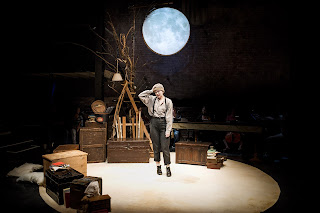 |
| Anna Starushkevych & Robyn Allegra Parton photograph Robert Workman |
In just over 75 minutes the selection of Handel's Italian arias and duets told the story of the girl (Robyn Allegra Parton) and the boy (Anna Starushkevych). Divided into four sections, the plot was roughly childhood - becoming friends; youth - falling in love; young adult - marrying; mature adult - divorce; old age - reconciliation and death. On a small flexible but fixed set with the instrumentalists behind, the plot was simply an excuse to make an enticing selection of Handel's arias and duets work live on stage.
The selection of music ranged widely with three of Handel's chamber duets, plus arias and duets from Rodelinda, Poro, Deidamia, Ariodante, La Resurrezione, Rinaldo and Il trionfo del Tempe e del Disinganno. The piece opened with the overture to Alcina and other instrumental movements were taken from Handel's Trio Sonata in B minor and from the ballet music to Ariodante. Recitative was kept to a minimum, but in keep with the work's pasticcio tradition it was written by the piece's creators Julian Perkins and Max Hoehn.
They were blessed with a pair of performers in Robyn Allegra Parton and Anna Starushkevych who not only had the technical facility for performing the music but who could give it vibrant life. Both have rich, rather interesting voices with a straightness to their delivery which I found appealing.
 |
| Anna Starushkevych - photo Robert Workman |
Parton's solo arias were perhaps rather lesser known, Due bell'alme Deidamia's act one aria from Deidamia, Neghittosi Dalinda's act three revenge aria from Ariodante and Tu del Ciel from Il Trionfo del Tempo e del Disinganno which was used as a final aria in a touching scene after the boy's death.
There was undoubtedly an element of whimsical fantasy about the production but this was anchored by the appealing directness of the performances and the emotional strength of the music, particularly in the operatic duets where Handel produced some of his most affecting and powerful writing.
It was lovely to get a chance to hear three of his chamber duets, Tanti Strali al sen mio schocchi (written 1711), Sono liete, fortunate (written 1710 - 1711) and Ahi, nelle sorte umane (written 1745) though a little voice inside me niggled that they did not always have quite the dramatic potency of Handel's operatic writing. The early duet, Tanti Strali particularly seemed to wander around a bit.
We were also treated to Caro. Dolce. Amico amplesso, Poro and Cleofide's duet from Poro and Io t'abbraccio the glorious duet for Rodelinda and Bertarido which concludes the second act of Rodelinda, here used as a final reconciliation. Parton and Starushkevych were beautifully balanced in the duets, both giving full weight to the music and a wonderfully moving account of the final duet.
Handelian opera seria does not naturally contain many duets, and in Handel's day a pasticcio would have had far more recitative. But Max Hoehn's staging and plot simply provided a structure to enable his performers to bring this glorious music to life on stage again.
Playing the overture to Alcina with just eight instrumentalists was perhaps something of a stretch, but Sounds Baroque gave a sympathetic and lively accompaniment whilst providing some lovely solo moments. The two oboists flexibly doubled on recorder so the evening contained a lovely range of timbres. Julian Perkins directed with aplomb from the harpsichord, though there were corners where I felt the performance might have benefited from a dedicated conductor with a separate harpsichord player.
I could have wished that the producers had been a little more daring; I would have liked more recitative so that we could find out who these people were, and I did wish that they had performed it in English. Despite the discreet surtitles and the communicativeness of the performances, the work would have benefited from being in the audience's language.
This was a delightful evening, full of superbly dramatic performances of some of Handel's most dramatic music. The production is at Grimeborn until 31 August, and travels to the Sheldonian Theatre, Oxford and the Epstein Theatre, Liverpool in the Autumn, but it deserves a far wider currency.
Elsewhere on this blog:
- Glad to be Gray - we are included in Saga Magazine's Top 50 Bloggers over 50
- Man on a mission - Dionysios Kyropoulos talks Historically Informed Stagecraft
- Vivid and involving - Katherine Broderick and Marcus Farnsworth at the North Norfolk Music Festival
- Fairytales for Accordion - CD review
- Pelleas et Melisande at the Grimeborn Festival
- Motets pour la Maison de Guise - CD review
- St Lawrence Jewry August Music Festival
- Janet Baker 80th birthday tribute
- Vivienne - a second view
- The Romantic Cello - Philip Handy - CD review
- Tete a Tete:the Opera Festival - a third helping
- Home



%20and%20kids.jpg)
.webp)


.jpg)



No comments:
Post a Comment